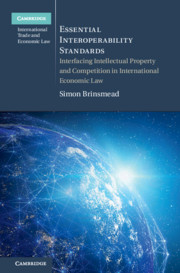 Essential Interoperability Standards
Essential Interoperability Standards Book contents
- Essential Interoperability Standards
- Cambridge International Trade and Economic Law
- Essential Interoperability Standards
- Copyright page
- Dedication
- Contents
- Foreword
- Preface
- Abbreviations
- Part I Foundations and Problems
- 1 Introduction
- 2 Standards and Interoperability Standards
- 3 Interoperability Standards and International Economic Law
- Part II The Impact of Intellectual Property and Competition Laws
- Part III Towards Liability and Compensation
- Bibliography
- Index
2 - Standards and Interoperability Standards
from Part I - Foundations and Problems
Published online by Cambridge University Press: 26 October 2021
- Essential Interoperability Standards
- Cambridge International Trade and Economic Law
- Essential Interoperability Standards
- Copyright page
- Dedication
- Contents
- Foreword
- Preface
- Abbreviations
- Part I Foundations and Problems
- 1 Introduction
- 2 Standards and Interoperability Standards
- 3 Interoperability Standards and International Economic Law
- Part II The Impact of Intellectual Property and Competition Laws
- Part III Towards Liability and Compensation
- Bibliography
- Index
Summary
This chapter outlines the nature of standards, with a particular focus on interoperability or compatibility standards. Standards in concept are introduced. A typology of standards is provided, which distinguishes between ‘interoperability’ or ‘compatibility’ standards and other types of standards, as well as between formal and de facto standards. The concept of an interoperability or compatibility standard is then examined in more detail. The work then examines and discusses some noteworthy interoperability standards, both from within and outside the field of information and communications technology (ICT). The key fora for the creation of interoperability standards are surveyed. The highly variegated nature of the interoperability standards-setting landscape is emphasized, as well as the relative ease with which standard-setting initiatives can migrate from one forum to another. The economic characteristics of interoperability standards are examined, in particular demand-side economies of scale or ‘network effects’, both direct and indirect (the latter being of primary importance to the work).
- Type
- Chapter
- Information
- Essential Interoperability StandardsInterfacing Intellectual Property and Competition in International Economic Law, pp. 16 - 53Publisher: Cambridge University PressPrint publication year: 2021
- 1
- Cited by


